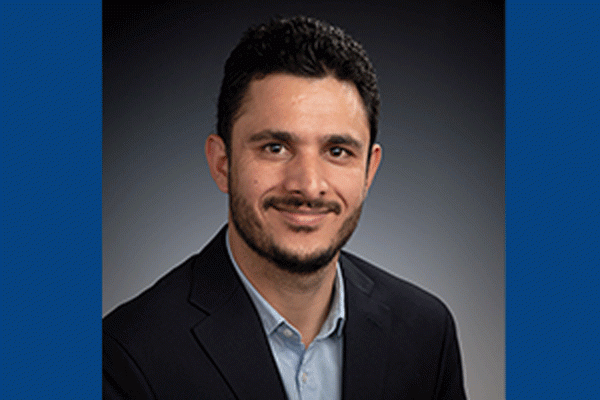
Umar Mehraj, PhD, a postdoctoral fellow in the laboratory of Assistant Professor Everardo Macias, PhD, has been awarded a United States Department of Defense (DoD) Prostate Cancer Research Program (PCRP) 2024 Early Career Investigator Award. In addition to Macias, Mehraj’s co-mentor is Jiaoti Huang, MD, PhD, Johnston-West Endowed Department Chair of Pathology and pioneer in the field of small cell neuroendocrine prostate cancer.
Neuroendocrine prostate cancer (NEPC) is an aggressive variant of castration-resistant prostate cancer, the second most common cause of death from cancer in the United States. This variant is characterized by a morphologic transition from conventional adenocarcinoma towards high-grade neuroendocrine/small cell carcinoma. As such, NEPC doesn’t respond to standard therapies, and there are no molecular-targeted therapies or universally-accepted treatment protocols. So, exploring new mechanisms that might be implicated in the progression of prostate cancer to the neuroendocrine subtype may help identify a new therapy that could prolong the survival of this subset of patients.
The Macias Lab previously published that NUAK2—a type of protein that helps regulate various important processes in our cells—progresses from normal prostate tissue to prostate adenocarcinoma and gradually continues to rise as the disease advances to later clinical stages. More importantly, the previous study showed that, being a kinase protein, NUAK2 is a very druggable protein.
"The Macias Lab previously published that the amount of NUAK2 (a type of protein that helps regulate various important processes in our cells) increases in prostate adenocarcinoma compared to that in normal tissue and NUAK2 gradually continues to increase as the disease progresses to later clinical stages."
In new unpublished data, the Macias lab identified an FDA-approved compound that has high off-target activity towards NUAK2 and can be repurposed to target NUAK2 for prostate cancer therapy. The award will fund a project in which Mehraj aims to demonstrate whether NUAK2 contributes to neuroendocrine prostate cancer progression. He will also investigate whether the disruption of NUAK2 activity via small molecule inhibitors enhances efficacy when combined with platinum-based chemotherapeutic agents used to treat NEPC.
“Dr. Mehraj is an extremely talented and dedicated researcher,” said Macias. “Despite facing many obstacles and having limited resources during his PhD studies, he was very productive. I continue to be impressed by his determination and perseverance. I am dedicated to seeing that he accomplishes his goal of becoming an independent academic investigator and have no doubt he will make significant contributions in the field.”
Mehraj received his PhD from the School of Life Sciences, University of Kashmir, India, where he studied the therapeutic potential of combination therapy and drug repurposing in Triple-Negative Breast Cancer (TNBC). He is currently studying the non-canonical signaling cascade of adenosine monophosphate-activated protein kinase (AMPK)-related kinases in neuroendocrine prostate tumors and exploring more effective therapies for advanced and neuroendocrine prostate tumors.